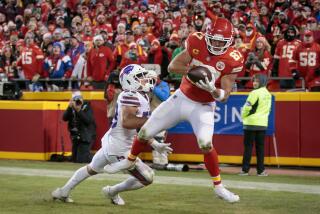Miami Didn’t Beat the Clock or Raiders : Pro football: Problems with new rules affected offenses of both teams in Monday night game.
- Share via
Thanks to some new rule changes that were intended to speed things up, football has become as much a game of beat the clock as beat the opponent.
In the Raiders’ 13-10 victory over Miami Monday night, an important game was dramatically altered because both teams had trouble snapping the ball before the play clock expired.
Raider quarterback Jay Schroeder and Miami’s Dan Marino spent much of the night in a constant rush to the line of scrimmage. Miami’s mismanagement of the clock on several occasions possibly cost the Dolphins the victory.
A quick recap:
--In the second quarter, the Dolphins were called for delay of game on fourth and one at the Raider 44. Instead of going for a first down, Miami had to punt.
--In the fourth quarter, the Dolphins scored what might have been the game-winning touchdown on a three-yard pass from Marino to Mark Duper, but the officials nullified the play because the play clock had beaten the snap by a split second. Marino hotly protested the call, but when the Dolphins lined up again, they had to call time out as the clock ticked toward zero.
Later in the game, it appeared the Dolphins would go for a first down on fourth and five at their own 46, but instead they had to use their second timeout of the half because time was about to expire. Miami then changed its mind and decided to punt, but only after being penalized again for another delay.
Consequently, when the Dolphins got the ball back at their own 43 with 1:58 remaining, trailing by three points, they were short of timeouts and the Raiders held on to win.
Miami, under Don Shula, has long been considered one of the league’s best-coached teams. So what’s going on here?
No one is quite sure. Schroeder, a man who should know, said he still doesn’t completely understand the new clock rule, although he fared slightly better with it than Marino.
This year, the time allotted between plays is either 40 or 25 seconds, depending on the situation. After most plays, the offensive team gets 40 seconds to start another.
According to the rule, a team is allowed a 25-second interval after “certain administrative stoppages and game delays.” These would include official timeouts, measurements and delays for player injuries.
Also, the clock is not stopped anymore on running plays out of bounds, with the exception of during the last two minutes of the half and the final five minutes of the game.
On incomplete passes, the clock is restarted shortly thereafter on the official’s signal. In other words, a team can now get caught with its receivers lagging downfield.
“It’s confusing,” Schroeder said. “Whether it’s 40 or 25, you’ve just got to keep your eye on the clock. I’m still not sure.”
In one case Monday night, the Raiders had a 40-second clock set until officials called time for an injured Miami player. When play resumed, the official reset the clock at 25 seconds, costing the Raiders 15 seconds, which forced them to rush the play.
Schroeder said the new clock rule has changed the way the game is played.
“It puts you in tough situations,” he said. “You’ve got to get used to it.”
The Raiders have had problems in that area all season. After a long drive on their first possession Monday, they decided to go for a first down on fourth and one at the Miami 10, but were forced to rush the important play because the play clock was about to expire. Some of the team’s offensive linemen had barely set when the ball was snapped, and running back Marcus Allen was stopped cold.
Raider Coach Art Shell said he wasn’t as concerned with the play-clock problem.
“It’s just a matter of making adjustments,” he said.
More to Read
Go beyond the scoreboard
Get the latest on L.A.'s teams in the daily Sports Report newsletter.
You may occasionally receive promotional content from the Los Angeles Times.











